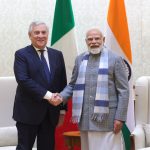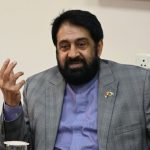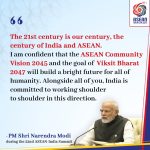 NEW YORK: Putting the ball in Islamabad’s court, India’s Prime Minister Narendra Modi has underlined that that he wants to hold bilateral talks with Pakistan, but only “without a shadow of terrorism,” and provided the latter creates the right atmosphere for it.
NEW YORK: Putting the ball in Islamabad’s court, India’s Prime Minister Narendra Modi has underlined that that he wants to hold bilateral talks with Pakistan, but only “without a shadow of terrorism,” and provided the latter creates the right atmosphere for it.
In his maiden address to the 69th session of the ongoing UN General Assembly on a radiant sunny day in New York, Mr Modi outlined his foreign policy on India’s neighbourhood, and signalled in a statesman-like manner that he wants to engage with Pakistan with all seriousness.
The Indian leader’s comments came a day after Pakistan’s Prime Minister Nawaz Sharif voiced frustration over stalled talks over Kashmir and more than a month after India cancelled foreign secretary-level talks with Pakistan by registering strong objections to the Pakistani envoy’s meeting with Kashmiri separatist leaders.
“I want to hold bilateral talks to improve friendship and cooperation in all seriousness and in an atmosphere of peace, without a shadow of terrorism,” Mr Modi told the world body in Hindi. “But this is also the duty of Pakistan to come forward and create an appropriate atmosphere and with all seriousness come forward for a bilateral dialogue,” he said.
Keeping his government’s focus on neighbours first foreign policy, Mr Modi is set to meet the leaders of Bangladesh, Sri Lanka and Nepal in New York on September 27, the day two of his first trip to the US as the prime minister of India.
In a sign of a measured but tough stance towards Pakistan, Mr Modi has avoided a meeting with his Pakistani counterpart on the margins of the UNGA. This is the unambiguous signal to Islamabad that the latter must walk the talk and honour repeated assurances given to New Delhi not to allow its territory to be used for anti-India activities.
In his address to the UNGA September 26, Mr Sharif had said that a “veil” cannot be drawn on the issue of Kashmir and blamed India for the cancellation of the foreign secretary level talks between the two countries in August, saying it was another “missed opportunity” to settle disputes and build economic and trade relations.
India emphatically rejected the “untenable comments” made by the Pakistani leader on Jammu and Kashmir in the UNGA, and underlined that the people of the state have peacefully chosen their destiny in accordance with universally accepted democratic principles.
Using its Right of Reply on the floor of the General Assembly to Mr Sharif’s “unwarranted references” in his UNGA address, Abhishek Singh, First Secretary in the Indian mission to the UN said in the General Assembly, said that India rejected “entirety the untenable comments of the distinguished delegate of Pakistan.”
Author Profile

- Manish Chand is Founder and Editor-in-Chief of India Writes Network (www.indiawrites.org) and India and World, a pioneering magazine focused on international affairs. He is CEO, Centre for Global India Insights, an India-based think tank focused on global affairs.
Latest entries
 India and the WorldDecember 12, 2025India-Italy bonding: Tajani’s visit raises the bar for business, maritime ties
India and the WorldDecember 12, 2025India-Italy bonding: Tajani’s visit raises the bar for business, maritime ties In ConversationNovember 26, 2025G20 is a Force for global Good
In ConversationNovember 26, 2025G20 is a Force for global Good articlesNovember 26, 2025Rescuing G20 from North-South divide: Ubuntu Moment
articlesNovember 26, 2025Rescuing G20 from North-South divide: Ubuntu Moment India and the WorldOctober 27, 2025Modi hails the century of India and ASEAN, backs ASEAN centrality
India and the WorldOctober 27, 2025Modi hails the century of India and ASEAN, backs ASEAN centrality







